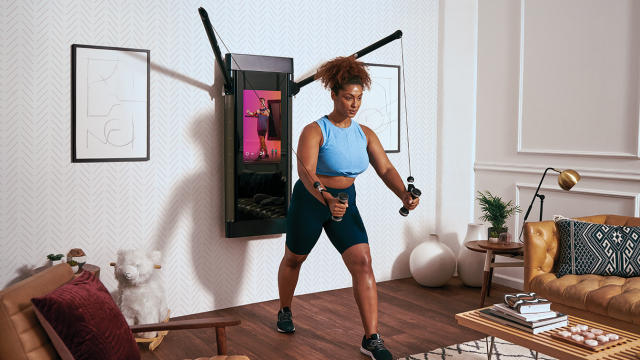The virtual home fitness start-up Tonal, which folks have already started calling the Peloton of strength training, announced on Thursday that it raised an additional $US110 ($151) million in its latest round of funding, making it clear that investors are eager to get in on the increasingly crowded digital fitness market. A market that’s been fuelled in part by the covid-19 pandemic shuttering gyms all over the world, leading many to try and approximate the gym experience from the comfort of their living rooms.
The Bay Area-based startup’s total funding now comes to $US200 ($274) million with investments from Amazon’s Alexa Fund, Delta-v Capital, Mousse Partners, L Catterton, and more than 20 athletes, including Serena Williams and Stephen Curry among others. Tonal’s smart strength-training machine mounts to the wall and uses “digital weights” to create up to 200 pounds of combined resistance that mimics traditional dumbbell- and barbell-workouts. And while its $US3,000 ($4,116) price tag is not cheap by any means, that price puts it on par with other products in the luxury workout gadget sphere from competitors like Peloton and Mirror, another start-up that was recently acquired by the athleisure company Lululemon for $US500 ($686) million.
[referenced id=”1226226″ url=”https://gizmodo.com.au/2020/06/i-know-its-us3000-4363-and-a-pain-to-install-but-tonal-is-worth-it/” thumb=”https://gizmodo.com.au/wp-content/uploads/2020/06/27/nvpeacymn4tap2d6plnf-300×169.jpg” title=”I Know It’s $US4,000 ($5,488) and a Pain to Install, But Tonal Is Worth It” excerpt=”I’ve spent a good portion of my time inside during lockdown sifting through the best Instagram Live workouts, but working out at home isn’t really my thing. The global covid-19 pandemic — and subsequent gym closures — forced me to reevaluate that stance. Free streaming workouts are fine and all,…”]
The news of Tonal’s windfall comes just days after Apple announced Fitness+, the tech giant’s new subscription workout service centered around its smartwatch. Arriving sometime later this year, the service will feature a variety of studio-style workout videos and sync up with the user’s Apple Watch to track metrics like how many calories they’ve burned and their heart rate, pace, and distance while they follow along.
It remains to be seen how Apple’s Fitness+ will stack up against its more firmly established competitors in the virtual fitness industry. Apple does have one huge advantage right out the gate though: The company’s said its service will cost $US9.99 ($14) per month or $US79.99 ($110) for a full year, an entry-level price point that’s significantly easier to stomach for your average consumer who may not want or be able to shell out several thousand dollars for a high-tech home-gym gadget. But Tonal CEO and founder Aly Orady says he isn’t too worried about Apple, per an interview with CNN.
“It is further validation that the world has shifted to workout-at-home,” Orady told the outlet. “It was a trend that we saw start a number of years ago and what Covid has done is accelerate that — and Apple is just acknowledging that the world has shifted. People aren’t going to go to the gym as the primary place where they work out anymore. They want to workout wherever they are and we think that is the future.”
Peloton CEO John Foley similarly praised Apple’s new fitness venture, calling the move a “legitimization” of this kind of content.
“We’re just digesting the announcement like everybody,” Foley told CNBC earlier this week. “The biggest thing I will say is it’s quite a legitimization of fitness content, to the extent the biggest company in the word, a $US2 ($3) trillion company, is coming in and saying fitness content matters. It’s meaningful enough for Apple.”
First, we had the streaming wars, and now it looks like the virtual home gym race is heating up. I won’t be surprised if we see Amazon and Google dip their toes in the fitness gadget arena next, especially since the latter, like Apple, already has an existing health tracking service with Google Fit.
